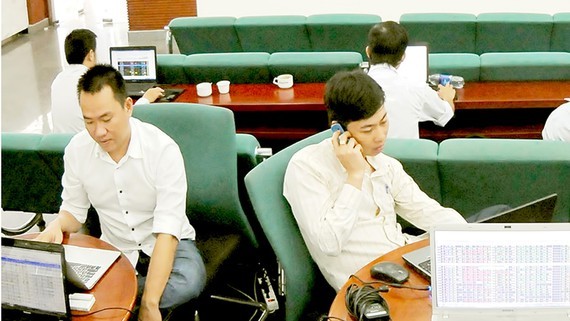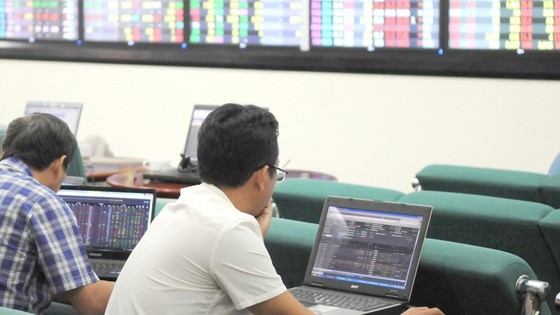 Domestic individual investors, one of the factors creating the growth of the stock market. (Photo: SGGP)
Domestic individual investors, one of the factors creating the growth of the stock market. (Photo: SGGP)
Money has not been withdrawn from the market yet
After the Lunar New Year, foreign investors had net sold for 24 trading sessions, creating considerable pressure on Vietnam's stock market. Explaining the fact that foreign investors were net sellers on Vietnam’s stock market in the context that Vietnam has controlled the Covid-19 pandemic, and economic activities have recovered well, experts said that in general, the above move is that foreign investors only restructure investment portfolio after a period of rapid growth in Vietnam's stock market.
Because this sector had disbursed in the period when the VN-Index was around 600-700 points. By the end of 2020, the benchmark approached 1,200 points, surpassed the historic peak of 1,200 points on April 1 this year, and is constantly setting new peaks, causing the Price to Earnings Ratio (P/E) of the stock market to increase by 17-18 times. The investment portfolios were profitable so foreign investors net sold to take profits. In March this year alone, foreign investors net sold nearly VND14 trillion on the Ho Chi Minh Stock Exchange (HoSE) due to network congestion.
Mr. Tran Hoang Son, Manager for Market Strategy of MB Securities Company (MBS), said that not only in Vietnam, but foreign investors had also withdrawn more than US$100 billion from emerging markets. Besides, this trend continued to prolong in the first months of this year because the US long-term Government bond yields continued to increase, causing the currencies of emerging markets, such as Turkey, South Korea, and Brazil, to devalue against the US dollar. This urged foreign investors to quickly withdraw money from the stock market to preserve their capital.
For instance, South Korea’s won decreased by about 4 percent compared to the US dollar, causing the Korea Investment Management Fund (KIM) to have withdrawn more than $60 million from Vietnam’s stock market so far this year. Besides, other stock markets, such as the US and Japan have a better growth potential than Vietnam's stock market as the governments of these countries launched many stimulus packages that made their stock markets increase strongly. In addition, many foreign investors evaluate that the scale of capital injection to support the Vietnamese economy is not large, so they consider the investment. Along with that, China tends to lower financial leverage, reduce money supply because of concerns about the risk of bond default. This has affected the Asian stock market, thereby causing net selling pressure of the foreign sector on Vietnam’s stock market.
Analyzing further, the representative of the Vietnam Securities Depository Center (VSD) said that besides investment portfolio restructuring, foreign investors also net sold because of concerns about exchange rate fluctuations. However, previously, foreign investors held 21-22 percent of the total number of shares circulating in the market, and currently, they have only drawn about 3 percent. Noticeably, foreign investors were net sellers but they still kept cash in their accounts, instead of withdrawing capital from the market and waiting for disbursement at the time when the market makes corrections. Currently, the amount of cash that foreign investors left on their accounts is about $2.7 billion, while the figure was $1.2 billion at the end of last year.
Foreign capital will soon return
An analyst of Rong Viet Securities Company (VDSC) said that although foreign investors maintained their net selling for more than one year, this is an insignificant risk, thanks to the strong participation of domestic individual investors and new foreign funds. Specifically, at the end of March this year, a new exchange-traded fund from Taiwan (China), Fubon FTSE Vietnam, conducted an IPO and raised 5.28 billion New Taiwan dollars (roughly VND4.28 trillion).
After the Lunar New Year, foreign investors had net sold for 24 trading sessions, creating considerable pressure on Vietnam's stock market. Explaining the fact that foreign investors were net sellers on Vietnam’s stock market in the context that Vietnam has controlled the Covid-19 pandemic, and economic activities have recovered well, experts said that in general, the above move is that foreign investors only restructure investment portfolio after a period of rapid growth in Vietnam's stock market.
Because this sector had disbursed in the period when the VN-Index was around 600-700 points. By the end of 2020, the benchmark approached 1,200 points, surpassed the historic peak of 1,200 points on April 1 this year, and is constantly setting new peaks, causing the Price to Earnings Ratio (P/E) of the stock market to increase by 17-18 times. The investment portfolios were profitable so foreign investors net sold to take profits. In March this year alone, foreign investors net sold nearly VND14 trillion on the Ho Chi Minh Stock Exchange (HoSE) due to network congestion.
Mr. Tran Hoang Son, Manager for Market Strategy of MB Securities Company (MBS), said that not only in Vietnam, but foreign investors had also withdrawn more than US$100 billion from emerging markets. Besides, this trend continued to prolong in the first months of this year because the US long-term Government bond yields continued to increase, causing the currencies of emerging markets, such as Turkey, South Korea, and Brazil, to devalue against the US dollar. This urged foreign investors to quickly withdraw money from the stock market to preserve their capital.
For instance, South Korea’s won decreased by about 4 percent compared to the US dollar, causing the Korea Investment Management Fund (KIM) to have withdrawn more than $60 million from Vietnam’s stock market so far this year. Besides, other stock markets, such as the US and Japan have a better growth potential than Vietnam's stock market as the governments of these countries launched many stimulus packages that made their stock markets increase strongly. In addition, many foreign investors evaluate that the scale of capital injection to support the Vietnamese economy is not large, so they consider the investment. Along with that, China tends to lower financial leverage, reduce money supply because of concerns about the risk of bond default. This has affected the Asian stock market, thereby causing net selling pressure of the foreign sector on Vietnam’s stock market.
Analyzing further, the representative of the Vietnam Securities Depository Center (VSD) said that besides investment portfolio restructuring, foreign investors also net sold because of concerns about exchange rate fluctuations. However, previously, foreign investors held 21-22 percent of the total number of shares circulating in the market, and currently, they have only drawn about 3 percent. Noticeably, foreign investors were net sellers but they still kept cash in their accounts, instead of withdrawing capital from the market and waiting for disbursement at the time when the market makes corrections. Currently, the amount of cash that foreign investors left on their accounts is about $2.7 billion, while the figure was $1.2 billion at the end of last year.
Foreign capital will soon return
An analyst of Rong Viet Securities Company (VDSC) said that although foreign investors maintained their net selling for more than one year, this is an insignificant risk, thanks to the strong participation of domestic individual investors and new foreign funds. Specifically, at the end of March this year, a new exchange-traded fund from Taiwan (China), Fubon FTSE Vietnam, conducted an IPO and raised 5.28 billion New Taiwan dollars (roughly VND4.28 trillion).
 Domestic individual investors, one of the factors creating the growth of the stock market. (Photo: SGGP)
Domestic individual investors, one of the factors creating the growth of the stock market. (Photo: SGGP)
Earlier, Fubon FTSE Vietnam planned to mobilize up to 10 billion New Taiwan dollars (about VND8.1 trillion) to invest in Vietnam's stock market. Because this fund references the FTSE Vietnam 30 Index, this capital flow will likely create a boost for stocks in the VN30-Index basket, which account for 40-50 percent of the VN-Index's trading value and contribute to fortifying the rising momentum of the benchmark in the coming time. Besides the appearance of the exchange-traded funds, forecasts of many securities companies show several positive signals in the near future. Specifically, the VFM VN30 ETF has stopped withdrawing money and pumped money continuously into the market from March 25; the VFMVN Diamond ETF with a net value of $424 million has continuously attracted cash flow from foreign investors since early 2021 with a total value of nearly $95 million.
Experts also stated that many net foreign capital flows would soon return this year when MSCI officially upgraded rating for the Vietnam stock market. This will help Vietnam attract more capital flows of investment funds. And yet, after the VN-Index officially surpassed the peak of 1,200 points in 2018, foreign investment funds expected the benchmark to rise to 1,300-1,400 points in 2021.
Recently, the US Treasury Department has officially withdrawn Vietnam from the list of currency manipulators, which will also be the driving force to attract capital again. However, the overloading of the trading system on the HoSE remains an existing risk. If the State Securities Commission and the HoSE resolve this issue soon, transactions of foreign investors will be more vibrant shortly, including active investment funds and ETFs.
Experts also stated that many net foreign capital flows would soon return this year when MSCI officially upgraded rating for the Vietnam stock market. This will help Vietnam attract more capital flows of investment funds. And yet, after the VN-Index officially surpassed the peak of 1,200 points in 2018, foreign investment funds expected the benchmark to rise to 1,300-1,400 points in 2021.
Recently, the US Treasury Department has officially withdrawn Vietnam from the list of currency manipulators, which will also be the driving force to attract capital again. However, the overloading of the trading system on the HoSE remains an existing risk. If the State Securities Commission and the HoSE resolve this issue soon, transactions of foreign investors will be more vibrant shortly, including active investment funds and ETFs.
According to SSI Securities Company, Vietnam currently has many favorable factors to help reactivate capital flows from foreign investors. Specifically, a stable business environment and strict control on money supply are expected to help curb inflation. Most importantly, the macro data shows an obvious recovery of the Vietnamese economy. This is the factor promoting sustainable growth of Vietnam's stock market in the coming time. Therefore, Vietnam's stock market will still be an attractive destination for capital flows in the long run.
























